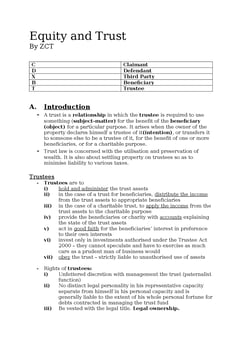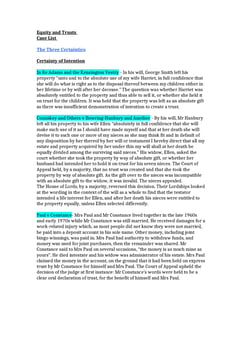FHR European Ventures LLP v Mankarious [2014] UKSC 45; [2014] 3 WLR 535
Judgement for the case FHR European Ventures LLP v Mankarious
Table Of Contents
KEY POINTS
In real estate transactions, when an agent negotiates the purchase of a hotel on behalf of buyers, a fiduciary duty is established.
Problems arise if the agent receives a secret commission from the seller post-sale.
-
The key issues include whether the agent holds the commission on trust for buyers and if buyers are entitled to a proprietary remedy.
Determining the agent's liability focuses on whether it is limited to equitable compensation, equivalent to the commission received.
Balancing fairness and accountability, this complex scenario involves fiduciary duties, secret commissions, and potential remedies for purchasers.
FACTS
Ramsey Neil Mankarious, Cedar Capital Partners LLC ("Second Defendant Company”) , established by the first defendant for consultancy services in the hotel industry, entered a brokerage agreement with the hotel owner.
This agreement involved facilitating the sale, earning a commission upon a successful sale, and disclosing its role to potential purchasers.
-
The first defendant encouraged the the Claimants (an investment group and some of its clients) to explore buying the hotel through his consultancy The list of claimants below:
FHR European Ventures LLP,
Kingdom Hotels International,
Kingdom 5—KR-176 Ltd,
Fairmont Hotels and Resorts Inc,
Fairmount Dubai Holdings (Bermuda) Ltd,
Bank of Scotland plc and
Uberior Ventures Ltd, an investment group which had purchased the Monte Carlo Grand Hotel in Monaco from a Monegasque company owned by the vendor
Monte Carlo Grand Hotel Ltd
-
The Second Defendant, with the first and third Defendants, advised the Claimants on the purchase, successfully negotiated the price, but failed to disclose its brokerage appointment.
Unbeknownst to the claimants, the Second Defendant received its commission after the sale.
Upon discovering the payment, the Claimants initiated legal proceedings, asserting the commission constituted a secret profit.
The judge ruled that the Second Defendant inadequately disclosed the brokerage agreement, preventing informed consent from the Claimants.
In a subsequent judgment, the court declared the Second Defendant liable to pay the Claimants an amount equal to the commission but stopped short of granting a proprietary remedy.
On appeal, the Court of Appeal sided with the Claimants, issuing a declaration that the Second Defendant held the commission on constructive trust for the Claimants absolutely.
The outcome reflects the court's recognition of the Second Defendant's failure to disclose, affirming the Claimants' entitlement to the commission amount.
JUDGEMENT
On the Second Defendant's appeal, the court dismissed it, affirming the equitable rule that when an agent acquires a benefit due to their fiduciary position, they are considered to have acquired it on behalf of the principal.
-
This rule applies especially in cases of bribes or secret commissions acquired in breach of the agent's fiduciary duty.
As a result, the Claimants were granted a proprietary remedy for the secret commission, reinforcing the principle of undivided loyalty owed by agents to their principals.
COMMENTARY
-
This case highlights the establishment of fiduciary duty when an agent negotiates a hotel purchase on behalf of buyers.
Issues arosewhen the agent failed to disclose a secret commission received post-sale.
Despite successful negotiations and purchase, the agent did not inform the buyers.
Legal proceedings ensued, and the court ruled in favor of the buyers, declaring the agent liable for the commission.
The Court of Appeal affirmed this decision, emphasizing the agent's failure to disclose and reinforcing the equitable rule that benefits acquired in breach of fiduciary duty are considered on behalf of the principal.
The outcome underscores the importance of accountability and fairness in such cases.
For Further Study on FHR European Ventures LLP v Mankarious

Equity notes fully updated for recent exams at Oxford and Cambridge. Th...
Need instant answers? Our AI exam tutor is here to help.
Ask questions 🙋 Get answers 📔 It's simple 👁️👄👁️
Our AI is educated by the highest scoring students across all subjects and schools. Join hundreds of your peers today.
Get StartedSimilar Cases
Related Product Samples
These product samples contain the same concepts we cover in this case.

 Since 2010, Oxbridge Notes has been a trusted education marketplace, supplying high-quality materials from top achievers at universities like Oxford, Cambridge, LSE, Harvard, and Yale.
Since 2010, Oxbridge Notes has been a trusted education marketplace, supplying high-quality materials from top achievers at universities like Oxford, Cambridge, LSE, Harvard, and Yale.